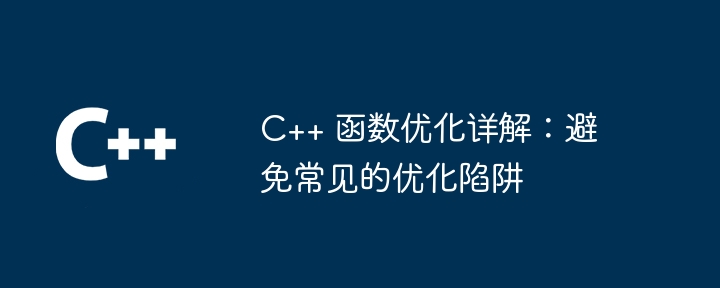
Avoid premature optimization and focus on actual performance bottlenecks. Inline functions carefully to avoid code bloat and longer compilation times. Follow const correctness guidelines to avoid accidental modification of input/output. Always make sure to initialize local variables before using them. Consider cache coherence, use volatile and appropriate synchronization mechanisms.

Detailed explanation of C function optimization: avoid common optimization traps
In C, function optimization is crucial to improving code performance . However, some common optimization pitfalls can prevent you from achieving maximum performance gains. This article takes a closer look at these pitfalls and provides practical techniques for avoiding them.
Trap 1: Premature Optimization
Premature optimization is optimizing for potential problems that may not occur at all. Instead, focus on identifying and solving actual performance bottlenecks. Use performance analysis tools such as Google Benchmark to identify areas for optimization.
Trap 2: Excessive inlining
Inline functions can improve performance, but excessive inlining can lead to code bloat and longer compilation times. Consider inlining only small functions (e.g. accessors, setters) and using compiler flags (e.g.-finline-functions-called-once) to optimize functions that are called only once.
Trap 3: Ignoring const correctness
const correctness ensures that the inputs and outputs of a function are not accidentally modified. Follow these guidelines:
constkeyword to modify parameters and local variables that will not be modified.constreferences.constreference to indicate that the output will not be modified.Trap 4: Uninitialized local variables
Uninitialized local variables can lead to undefined behavior. Always make sure to initialize local variables before use, such as using a constructor initializer or explicit assignment.
Trap 5: Cache consistency is not considered
In a multi-threaded environment, cache consistency is crucial. Be sure to use thevolatilekeyword to mark data that may be modified by multiple threads simultaneously. The use of atomic operations and appropriate synchronization mechanisms should also be considered.
Practical Case
Consider the following function:
int sumArray(int* arr, int size) { int sum = 0; for (int i = 0; i < size; i++) { sum += arr[i]; } return sum; }
Applying these optimization techniques, we can improve this function:
inline int sumArrayConstCorrect(const int* arr, int size) { int sum = 0; for (int i = 0; i < size; i++) { sum += arr[i]; // const 正确性 } return sum; }
Passed By marking a function asinlineand addingconstcorrectness, we improve the function's performance while avoiding potential pitfalls.
Conclusion
Avoiding these common function optimization pitfalls can significantly improve the performance of your C code. By focusing on real bottlenecks, careful inlining, ensuring const correctness, initializing local variables, and accounting for cache coherence, you can create efficient, reliable applications.
The above is the detailed content of Detailed explanation of C++ function optimization: avoid common optimization traps. For more information, please follow other related articles on the PHP Chinese website!
 What are the differences between c++ and c language
What are the differences between c++ and c language Recommended learning order for c++ and python
Recommended learning order for c++ and python Cost-effectiveness analysis of learning python and c++
Cost-effectiveness analysis of learning python and c++ Is c language the same as c++?
Is c language the same as c++? Which is better to learn first, c language or c++?
Which is better to learn first, c language or c++? The difference and connection between c language and c++
The difference and connection between c language and c++ C++ software Chinese change tutorial
C++ software Chinese change tutorial Cost-effectiveness analysis of learning python, java and c++
Cost-effectiveness analysis of learning python, java and c++



